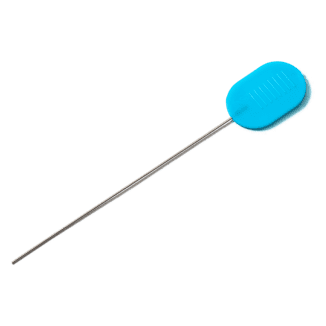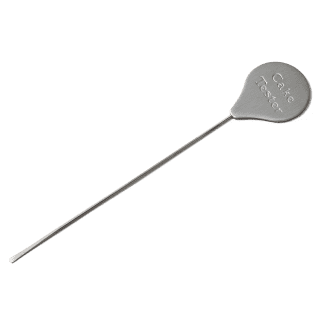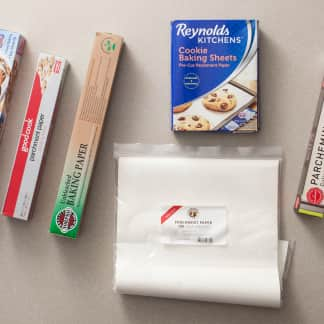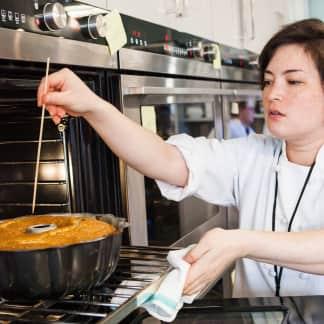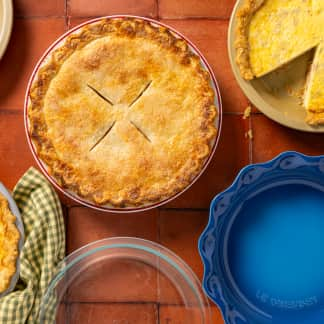Cake testers are beloved by restaurant cooks, who use these fine metal probes to check the doneness of not only baked goods but also vegetables, meat, and fish. We were curious to see if these tools were truly as useful and versatile as we’d heard. So we bought four cake testers, priced from about $3.00 to about $6.50, and used them to test the doneness of Olive Oil Cake, Classic Quiche Lorraine, Chocolate Sour Cream Bundt Cake, and boiled potatoes at different stages of their cooking times. Along the way, we compared the cake testers’ results to those of the tools we might otherwise use to check the foods’ doneness: a bamboo toothpick or bamboo skewer for the baked goods and our favorite paring knife for the potatoes.
Cake Testers Have Some Advantages
We liked a few things about the cake testers. At 4 to 6 inches in length, their probes were all fine for poking shallow quiches and tall Bundt cakes alike. They can be washed and reused, eliminating the need to keep buying new disposable toothpicks or skewers. And they allow for prettier, more presentation-ready baked goods. Because most of the cake testers had probes that were fine and narrow, with a diameter of about 1 millimeter, they made holes that were much tinier than those made by the toothpicks (which had an average thickness of 2 millimeters) and bamboo skewers (which had an average thickness of 3 millimeters). While it was thin, the paring knife also made larger incisions than the needle-like cake testers.

Accuracy And Ease Of Use Are Limited
Ultimately, these advantages were overshadowed by a basic problem: The cake testers didn’t always give an accurate reading of the foods’ doneness. They were fine for evaluating whether the potatoes were cooked or not. Trouble arrived when we were testing the baked goods. In the test kitchen, we deem most baked goods done when a probe comes out clean, indicating that the batter inside has cooked through and the crumb is fully set. But sometimes we look for a moister texture in certain cakes, including our Chocolate Sour Cream Bundt Cake. For these, we want to see a few crumbs attached to the probe as proof that the cake is not completely dry. To our dismay, the cake testers came out clean every time we poked them into the cakes and quiche—except when the batter was still practically raw inside. By contrast, the bamboo skewers and toothpicks consistently gave us more accurate results, emerging clean when the cakes were fully baked and with crumbs when the interior was still moist.

What was going on? It turns out that while cake crumbs catch easily on the rough, textured surfaces of the bamboo skewers and toothpicks, they just can’t adhere to the smooth metal surfaces of the cake testers.
Leave The Cake Testers To The Professionals
So what do restaurant cooks know that we don’t? To learn more, we turned to cake tester evangelist, former restaurant cook, and current senior editor at Cook’s Illustrated, Lan Lam. Lam explained that restaurant cooks don’t just look at whether the cake tester came out clean or crumb laden; rather, they use the cake tester to gauge changes in texture as they push the cake tester through the food at different stages of the cooking time. Similarly, they also use the cake tester to evaluate changes in temperature when cooking meat or fish, inserting the probe into the protein for a few seconds and then placing it against their wrist to see if the food has warmed through to the correct doneness.
Lam explained that there’s a learning curve to employing a cake tester in this way, requiring the user to develop a more precise, intuitive understanding of what different doneness levels feel like in each type of food. By baking batch after batch of specific cakes, pastry chefs build that knowledge base quickly. Home cooks, on the other hand, rarely bake or cook in enough volume to get that sense down pat.
With this in mind, we can’t recommend any cake tester. Unless you’re embarking on a culinary career, we think you’re better off using a bamboo toothpick or skewer to check the doneness of your baked goods and an instant-read thermometer to evaluate the temperature of your meat or fish. The holes will be slightly bigger, but you’ll get a more accurate and reliable reading—and you’ll get it instantaneously, without putting in years of service in a restaurant kitchen.
- Test four cake testers, priced from about $3.00 to about $6.50, comparing their performance with that of other tools we use for testing doneness
- Test the doneness of Olive Oil Cake at different times
- Test the doneness of Classic Quiche Lorraine at different times
- Test the doneness of Chocolate Sour Cream Bundt Cake at different times
- Test the doneness of boiled potatoes at different times
- Wash according to manufacturers’ instructions 10 times

